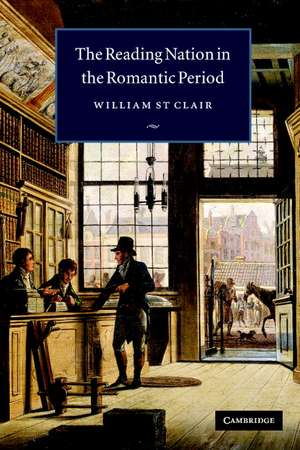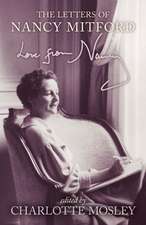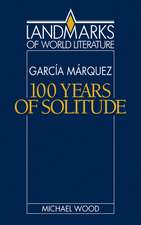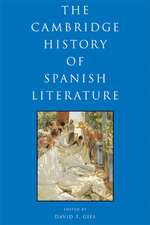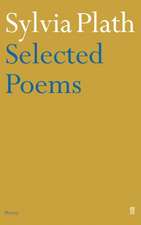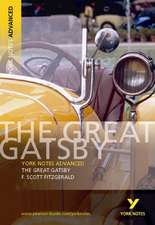The Reading Nation in the Romantic Period
Autor William St Clairen Limba Engleză Paperback – 3 ian 2007
Preț: 445.33 lei
Nou
Puncte Express: 668
Preț estimativ în valută:
85.21€ • 89.21$ • 70.51£
85.21€ • 89.21$ • 70.51£
Carte tipărită la comandă
Livrare economică 05-19 aprilie
Preluare comenzi: 021 569.72.76
Specificații
ISBN-13: 9780521699440
ISBN-10: 0521699444
Pagini: 796
Ilustrații: 22 b/w illus. 13 tables
Dimensiuni: 166 x 225 x 43 mm
Greutate: 1.06 kg
Editura: Cambridge University Press
Colecția Cambridge University Press
Locul publicării:Cambridge, United Kingdom
ISBN-10: 0521699444
Pagini: 796
Ilustrații: 22 b/w illus. 13 tables
Dimensiuni: 166 x 225 x 43 mm
Greutate: 1.06 kg
Editura: Cambridge University Press
Colecția Cambridge University Press
Locul publicării:Cambridge, United Kingdom
Cuprins
Illustrations; Tables; Acknowledgments; Abbreviations; 1. Reading and its consequences; 2. Economic characteristics of the printed book industry; 3. Intellectual property; 4. Anthologies, abridgment, and the development of commercial vested interests in prolonging the obsolete; 5. The high monopoly period in England; 6. The explosion of reading; 7. The old canon; 8. Shakespeare; 9. Literary production in the Romantic period; 10. Manufacturing; 11. Selling, prices, and access; 12. Romance; 13. Reading constituencies; 14. Horizons of expectations; 15. 'Those vile French piracies'; 16. 'Preparatory schools for the brothel and the gallows'; 17. At the boundaries of the reading nation; 18. Frankenstein; 19. North America; 20. Reading, reception, and dissemination; 21. The romantic poets in the Victorian age; 22. The political economy of reading.
Recenzii
'… magnificent, original and compelling study … stretches far wider than its title suggests. He has a mass of new and fascinating things to say about the centuries that followed the invention of printing and also about the Victorian age which succeeded the Romantic period … The Reading Nation is clearly written and is throughout enjoyable to read.' Ian Gilmour, London Review of Books
'Over the next half century many scholars will rely on this book, argue with it, and produce further evidence to support or challenge conclusions. I am prepared to say without qualification, however, that The Reading Nation in the Romantic Period is one of the most important scholarly books I have ever read.' Rob Hume, Philological Quarterly
'… a rich, ambitious, and invariably stimulating study of publishing practices in the English-speaking world that reaches back to the sixteenth century and forward to current debates about the globalization of intellectual property' Heather Jackson, The Times Literary Supplement
'it is absolutely indispensable. … It is strongly recommended reading for everyone interested in English literary history. There is nothing like it. We shall not be able to do without it. It defines a new standard in research into the history of reading.' Anglistik
' … shows how one can revise many of the old unexamined truisms concerning romanticism by scrupulous quantitative analysis, without necessarily forfeiting an evaluative and critical stance … Even more important is the dire story which the book tells, and the warning which it delivers to our own era, about the social and historical consequences of monopolizing knowledge.' Nigel Leask, History Workshop Journal
'… this dazzling, compulsively readable, intellectually challenging tour de force … St Clair brilliantly explores and explains the impact of economics, legal history, popular culture, societal structure, and bibliographic evidence, creating a seminal work, one that is truly indispensable to Romantic period scholars of every discipline. … This is a work of rigorous scholarship, imagination, supportable conclusions, and disciplined speculation. It is not to be missed.' Jack Gumpert Wasserman, The Byron Journal
'St Clair's voluminous book is important in the inter-related fields of publishing history, history of the book, and history of reading on two grounds - its methodology and its detailed data. St Clair's commentaries are informative, and his deductions will likely be regarded as bases for further studies.' Mid West Book Review
'The biggest idea the Tories ever had was to stop the people reading. Byron did more than anyone else to expose that crime and William St Clair has presented the whole story in an original guise.' Michael Foot, Tribune
'Mr St Clair's The Reading Nation in the Romantic Period is the most important and useful book I've ever read on the history of the English book trade. It covers a much greater time period than the title implies.' Terry Belanger, University Professor, Macarthur Fellow, University of Virginia
'St Clair's first few chapters are so well written and lucid that readers will be very quickly propelled into the subject, ready for the always pertinent supporting detail in chapters that range from Shakespeare to Frankenstein.' The Times Higher Education Supplement
'William St Clair's The Reading Nation in the Romantic Period (CUP) is a masterly investigation … St Clair pieces together a picture that is both startling and disturbing. St Clair's narrative is fascinating, illuminating and provocative with a liberal dash of humour, and at every stage his arguments are supported with an abundance of data gleaned from an astonishing array of sources … this book is a rare find, challenging and profoundly important and at the same time intriguing and eminently readable. I cannot recommend it highly enough.' The Edinburgh Academy Chronicle
'The footnotes in St Clair's narrative constantly refer the reader to his own appendices, a sign that the author has ploughed new and compelling scholarly furrows and has derived his interesting and equally compelling conclusions from a massive piece of genuinely new archival research. … undoubtedly worth every penny.' Rare Books Newsletter
'To anyone interested in intellectual property, or competition law, this scholarly, but eminently readable, work is highly commended. … it is invaluable as a well researched and readable discussion of the practical working such property rights in the publishing trade. It would not be surprising were this outstanding work to be found as 'lecture de chevet' for officials of the competition authorities in DG IV in Brussels or elsewhere.' Ronald David Mackay, Legal Information Management
'William St Clair's monumental new book is the most important contribution yet of the expanding field of book history to the study of Romantic literature … he has provided a firmer empirical foundation for speculation about the mentalities of Romantic readers than anything available before, and the implications of his stunningly original research will be pondered for years to come.' BARS Bulletin
' … an extraordinarily ambitious and impressive attempt to reformulate our knowledge of literary production and reception in the late eighteenth and early nineteenth centuries. With nearly 300 Circle pages devoted to thirteen appendices and bibliography, The Reading Nation is one of the most useful volumes ever published on Romantic literature.' Wordsworth Circle
'Over the next half century many scholars will rely on this book, argue with it, and produce further evidence to support or challenge conclusions. I am prepared to say without qualification, however, that The Reading Nation in the Romantic Period is one of the most important scholarly books I have ever read.' Rob Hume, Philological Quarterly
'… a rich, ambitious, and invariably stimulating study of publishing practices in the English-speaking world that reaches back to the sixteenth century and forward to current debates about the globalization of intellectual property' Heather Jackson, The Times Literary Supplement
'it is absolutely indispensable. … It is strongly recommended reading for everyone interested in English literary history. There is nothing like it. We shall not be able to do without it. It defines a new standard in research into the history of reading.' Anglistik
' … shows how one can revise many of the old unexamined truisms concerning romanticism by scrupulous quantitative analysis, without necessarily forfeiting an evaluative and critical stance … Even more important is the dire story which the book tells, and the warning which it delivers to our own era, about the social and historical consequences of monopolizing knowledge.' Nigel Leask, History Workshop Journal
'… this dazzling, compulsively readable, intellectually challenging tour de force … St Clair brilliantly explores and explains the impact of economics, legal history, popular culture, societal structure, and bibliographic evidence, creating a seminal work, one that is truly indispensable to Romantic period scholars of every discipline. … This is a work of rigorous scholarship, imagination, supportable conclusions, and disciplined speculation. It is not to be missed.' Jack Gumpert Wasserman, The Byron Journal
'St Clair's voluminous book is important in the inter-related fields of publishing history, history of the book, and history of reading on two grounds - its methodology and its detailed data. St Clair's commentaries are informative, and his deductions will likely be regarded as bases for further studies.' Mid West Book Review
'The biggest idea the Tories ever had was to stop the people reading. Byron did more than anyone else to expose that crime and William St Clair has presented the whole story in an original guise.' Michael Foot, Tribune
'Mr St Clair's The Reading Nation in the Romantic Period is the most important and useful book I've ever read on the history of the English book trade. It covers a much greater time period than the title implies.' Terry Belanger, University Professor, Macarthur Fellow, University of Virginia
'St Clair's first few chapters are so well written and lucid that readers will be very quickly propelled into the subject, ready for the always pertinent supporting detail in chapters that range from Shakespeare to Frankenstein.' The Times Higher Education Supplement
'William St Clair's The Reading Nation in the Romantic Period (CUP) is a masterly investigation … St Clair pieces together a picture that is both startling and disturbing. St Clair's narrative is fascinating, illuminating and provocative with a liberal dash of humour, and at every stage his arguments are supported with an abundance of data gleaned from an astonishing array of sources … this book is a rare find, challenging and profoundly important and at the same time intriguing and eminently readable. I cannot recommend it highly enough.' The Edinburgh Academy Chronicle
'The footnotes in St Clair's narrative constantly refer the reader to his own appendices, a sign that the author has ploughed new and compelling scholarly furrows and has derived his interesting and equally compelling conclusions from a massive piece of genuinely new archival research. … undoubtedly worth every penny.' Rare Books Newsletter
'To anyone interested in intellectual property, or competition law, this scholarly, but eminently readable, work is highly commended. … it is invaluable as a well researched and readable discussion of the practical working such property rights in the publishing trade. It would not be surprising were this outstanding work to be found as 'lecture de chevet' for officials of the competition authorities in DG IV in Brussels or elsewhere.' Ronald David Mackay, Legal Information Management
'William St Clair's monumental new book is the most important contribution yet of the expanding field of book history to the study of Romantic literature … he has provided a firmer empirical foundation for speculation about the mentalities of Romantic readers than anything available before, and the implications of his stunningly original research will be pondered for years to come.' BARS Bulletin
' … an extraordinarily ambitious and impressive attempt to reformulate our knowledge of literary production and reception in the late eighteenth and early nineteenth centuries. With nearly 300 Circle pages devoted to thirteen appendices and bibliography, The Reading Nation is one of the most useful volumes ever published on Romantic literature.' Wordsworth Circle
Descriere
This 2004 book investigates how the national culture can be understood through a study of books that were read.
